Unit6Whenwasitinvented教材全解加课后练习讲解(附答案)
- 格式:doc
- 大小:80.50 KB
- 文档页数:12
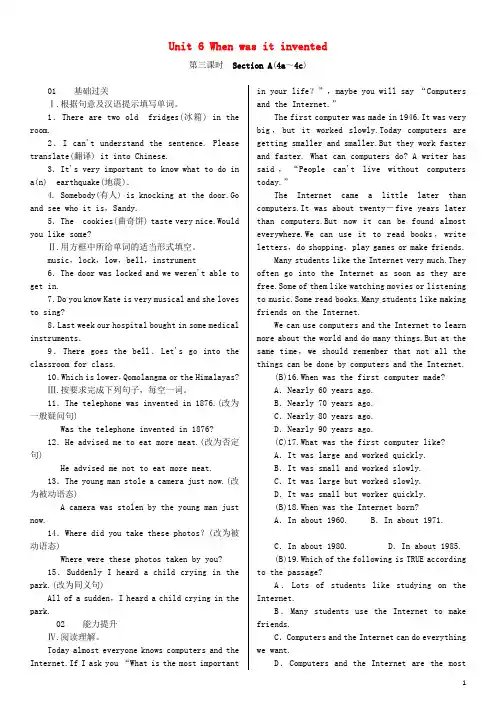
Unit 6 When was it invented 第三课时Section A(4a~4c)01 基础过关Ⅰ.根据句意及汉语提示填写单词。
1.There are two old fridges(冰箱) in the room.2.I can't understand the sentence. Please translate(翻译) it into Chinese.3.It's very important to know what to do in a(n) earthquake(地震).4. Somebody(有人) is knocking at the door.Go and see who it is,Sandy.5.The cookies(曲奇饼) taste very nice.Would you like some?Ⅱ.用方框中所给单词的适当形式填空。
music,lock,low,bell,instrument6.The door was locked and we weren't able to get in.7.Do you know Kate is very musical and she loves to sing?8.Last week our hospital bought in some medical instruments.9.There goes the bell.Let's go into the classroom for class.10.Which is lower,Qomolangma or the Himalayas?Ⅲ.按要求完成下列句子,每空一词。
11.The telephone was invented in 1876.(改为一般疑问句)Was the telephone invented in 1876?12.He advised me to eat more meat.(改为否定句)He advised me not to eat more meat.13.The young man stole a camera just now.(改为被动语态)A camera was stolen by the young man just now.14.Where did you take these photos?(改为被动语态)Where were these photos taken by you?15.Suddenly I heard a child crying in the park.(改为同义句)All of a sudden,I heard a child crying in the park.02 能力提升Ⅳ.阅读理解。
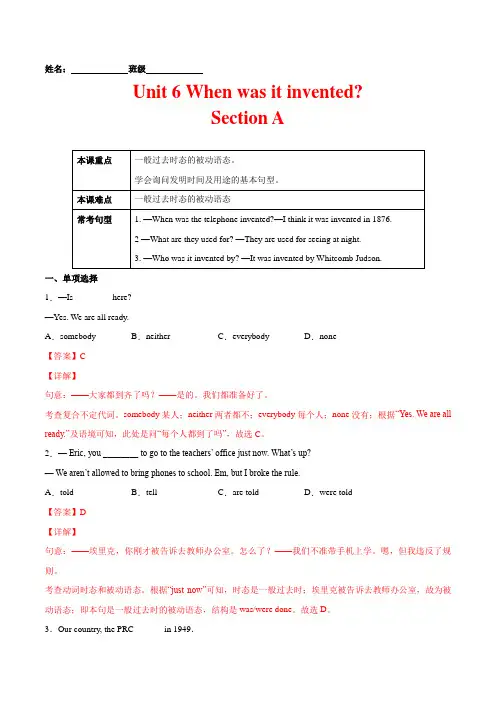
姓名:班级Unit 6 When was it invented?Section A一、单项选择1.—Is ________ here?—Yes. We are all ready.A.somebody B.neither C.everybody D.none【答案】C【详解】句意:——大家都到齐了吗?——是的。
我们都准备好了。
考查复合不定代词。
somebody某人;neither两者都不;everybody每个人;none没有;根据“Yes. We are all ready.”及语境可知,此处是问“每个人都到了吗”,故选C。
2.—Eric, you ________ to go to the teachers’ office just now. What’s up?—We aren’t allowed to bring phones to school. Em, but I broke the rule.A.told B.tell C.are told D.were told【答案】D【详解】句意:——埃里克,你刚才被告诉去教师办公室。
怎么了?——我们不准带手机上学。
嗯,但我违反了规则。
考查动词时态和被动语态。
根据“just now”可知,时态是一般过去时;埃里克被告诉去教师办公室,故为被动语态;即本句是一般过去时的被动语态,结构是was/were done。
故选D。
3.Our country, the PRC ______ in 1949.A.was found B.is foundedC.was founded D.has been found【答案】C【详解】句意:我们的祖国,中华人民共和国在1949年被建立。
考查一般过去时的被动语态。
find是动词,意为“发现”,过去分词为found;found是动词原形,意为“成立”,founded是其过去分词。
根据常识,中华人民共和国在1949年被建立,句子使用一般过去时被动语态。
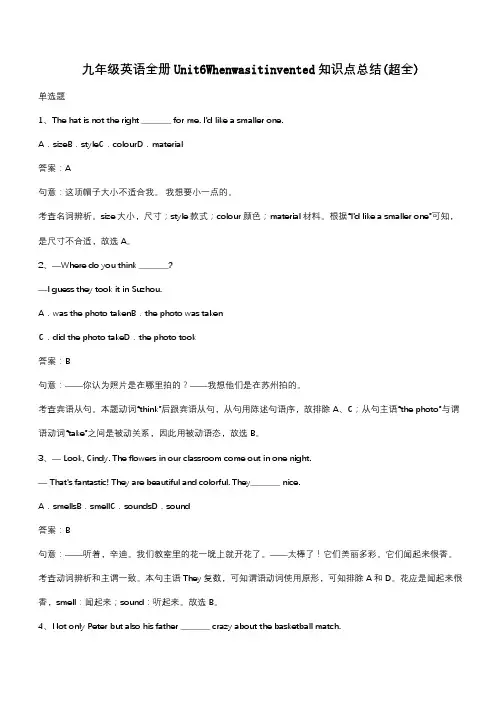
九年级英语全册Unit6Whenwasitinvented知识点总结(超全)单选题1、The hat is not the right ________ for me. I’d like a smaller one.A.sizeB.styleC.colourD.material答案:A句意:这顶帽子大小不适合我。
我想要小一点的。
考查名词辨析。
size大小,尺寸;style款式;colour颜色;material材料。
根据“I’d like a smaller one”可知,是尺寸不合适,故选A。
2、—Where do you think ________?—I guess they took it in Suzhou.A.was the photo takenB.the photo was takenC.did the photo takeD.the photo took答案:B句意:——你认为照片是在哪里拍的?——我想他们是在苏州拍的。
考查宾语从句。
本题动词“think”后跟宾语从句,从句用陈述句语序,故排除A、C;从句主语“the photo”与谓语动词“take”之间是被动关系,因此用被动语态,故选B。
3、— Look, Cindy. The flowers in our classroom come out in one night.— That's fantastic! They are beautiful and colorful. They________ nice. A.smellsB.smellC.soundsD.sound答案:B句意:——听着,辛迪。
我们教室里的花一晚上就开花了。
——太棒了!它们美丽多彩。
它们闻起来很香。
考查动词辨析和主谓一致。
本句主语They复数,可知谓语动词使用原形,可知排除A和D。
花应是闻起来很香,smell:闻起来;sound:听起来。
故选B。
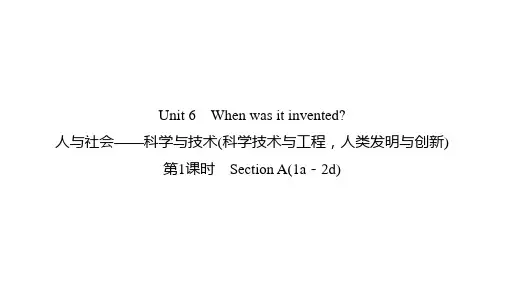
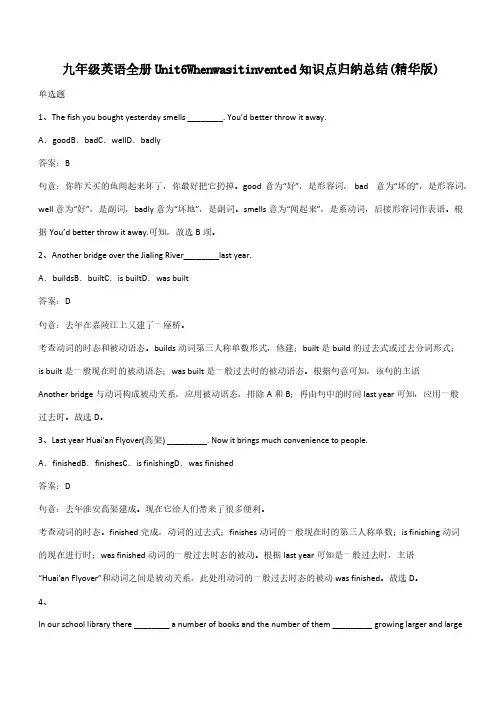
九年级英语全册Unit6Whenwasitinvented知识点归纳总结(精华版)单选题1、The fish you bought yesterday smells ________. You’d better throw it away. A.goodB.badC.wellD.badly答案:B句意:你昨天买的鱼闻起来坏了,你最好把它扔掉。
good意为“好”,是形容词, bad 意为“坏的”,是形容词,well意为“好”,是副词,badly意为“坏地”,是副词。
smells意为“闻起来”,是系动词,后接形容词作表语。
根据You’d better throw it away.可知,故选B项。
2、Another bridge over the Jialing River________last year.A.buildsB.builtC.is builtD.was built答案:D句意:去年在嘉陵江上又建了一座桥。
考查动词的时态和被动语态。
builds动词第三人称单数形式,修建;built是build的过去式或过去分词形式;is built是一般现在时的被动语态;was built是一般过去时的被动语态。
根据句意可知,该句的主语Another bridge与动词构成被动关系,应用被动语态,排除A和B;再由句中的时间last year可知,应用一般过去时。
故选D。
3、Last year Huai'an Flyover(高架) _________. Now it brings much convenience to people. A.finishedB.finishesC.is finishingD.was finished答案:D句意:去年淮安高架建成。
现在它给人们带来了很多便利。
考查动词的时态。
finished完成,动词的过去式;finishes动词的一般现在时的第三人称单数;is finishing动词的现在进行时;was finished动词的一般过去时态的被动。
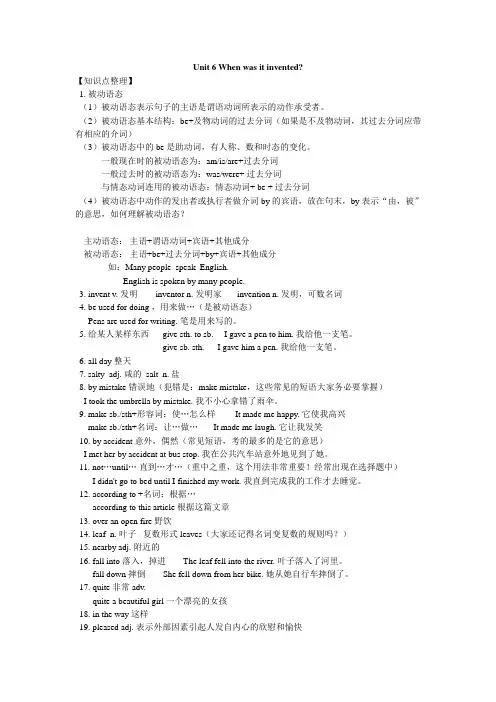
Unit 6 When was it invented?【知识点整理】1. 被动语态(1)被动语态表示句子的主语是谓语动词所表示的动作承受者。
(2)被动语态基本结构:be+及物动词的过去分词(如果是不及物动词,其过去分词应带有相应的介词)(3)被动语态中的be 是助动词,有人称、数和时态的变化。
一般现在时的被动语态为:am/is/are+过去分词一般过去时的被动语态为:was/were+ 过去分词与情态动词连用的被动语态:情态动词+ be + 过去分词(4)被动语态中动作的发出者或执行者做介词by的宾语,放在句末,by 表示“由,被”的意思,如何理解被动语态?主动语态:主语+谓语动词+宾语+其他成分被动语态:主语+be+过去分词+by+宾语+其他成分如:Many people speak English.English is spoken by many people.3. invent v. 发明 inventor n. 发明家 invention n. 发明,可数名词4. be used for doing ,用来做…(是被动语态)Pens are used for writing. 笔是用来写的。
5. 给某人某样东西 give sth. to sb. I gave a pen to him. 我给他一支笔。
give sb. sth. I gave him a pen. 我给他一支笔。
6. all day 整天7. salty adj. 咸的 salt n. 盐8. by mistake 错误地(犯错是:make mistake,这些常见的短语大家务必要掌握)I took the umbrella by mistake. 我不小心拿错了雨伞。
9. make sb./sth+形容词:使…怎么样 It made me happy. 它使我高兴make sb./sth+名词:让…做… It made me laugh. 它让我发笑10. by accident 意外,偶然(常见短语,考的最多的是它的意思)I met her by accident at bus stop. 我在公共汽车站意外地见到了她。
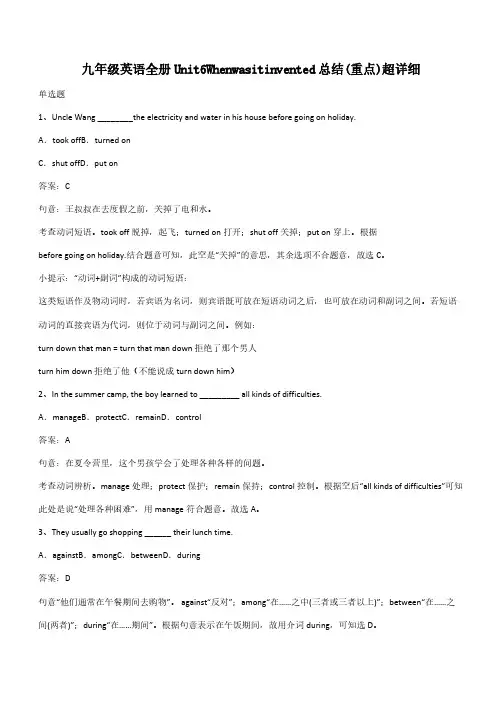
九年级英语全册Unit6Whenwasitinvented总结(重点)超详细单选题1、Uncle Wang ________the electricity and water in his house before going on holiday.A.took offB.turned onC.shut offD.put on答案:C句意:王叔叔在去度假之前,关掉了电和水。
考查动词短语。
took off脱掉,起飞;turned on打开;shut off关掉;put on穿上。
根据before going on holiday.结合题意可知,此空是“关掉”的意思,其余选项不合题意,故选C。
小提示:“动词+副词”构成的动词短语:这类短语作及物动词时,若宾语为名词,则宾语既可放在短语动词之后,也可放在动词和副词之间。
若短语动词的直接宾语为代词,则位于动词与副词之间。
例如:turn down that man = turn that man down 拒绝了那个男人turn him down 拒绝了他(不能说成turn down him)2、In the summer camp, the boy learned to _________ all kinds of difficulties. A.manageB.protectC.remainD.control答案:A句意:在夏令营里,这个男孩学会了处理各种各样的问题。
考查动词辨析。
manage处理;protect保护;remain保持;control控制。
根据空后“all kinds of difficulties”可知此处是说“处理各种困难”,用manage符合题意。
故选A。
3、They usually go shopping ______ their lunch time.A.againstB.amongC.betweenD.during答案:D句意“他们通常在午餐期间去购物”。
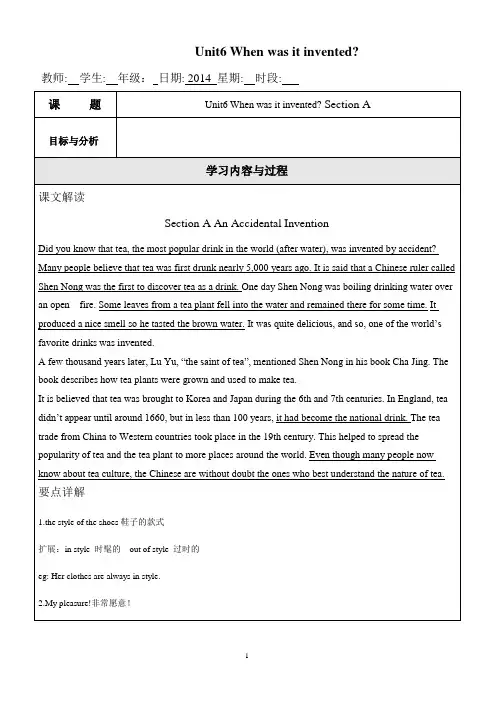
Unit6 When was it invented?教师: 学生: 年级:日期: 2014 星期: 时段:课题Unit6 When was it invented? Section A目标与分析学习内容与过程课文解读Section A An Accidental InventionDid you know that tea, the most popular drink in the world (after water), was invented by accident? Many people believe that tea was first drunk nearly 5,000 years ago. It is said that a Chinese ruler called Shen Nong was the first to discover tea as a drink. One day Shen Nong was boiling drinking water over an open fire. Some leaves from a tea plant fell into the water and remained there for some time. It produced a nice smell so he tasted the brown water. It was quite delicious, and so, one of the world’s favorite drinks was invented.A few thousand years later, Lu Yu, ―the saint of tea‖, m entioned Shen Nong in his book Cha Jing. The book describes how tea plants were grown and used to make tea.It is believed that tea was brought to Korea and Japan during the 6th and 7th centuries. In England, tea didn’t appear until around 1660, but in le ss than 100 years, it had become the national drink. The tea trade from China to Western countries took place in the 19th century. This helped to spread the popularity of tea and the tea plant to more places around the world. Even though many people now know about tea culture, the Chinese are without doubt the ones who best understand the nature of tea. 要点详解1.the style of the shoes鞋子的款式扩展:in style 时髦的out of style 过时的eg: Her clothes are always in style.2.My pleasure!非常愿意!辨析pleasure / pleased / pleasantpleasure n. 高兴,愉悦My pleasure. /With pleasure / It’s a pleasure. --Thanks for helping me. –My pleasure. pleased adj 高兴的be pleased to do sth 乐于做某事be pleased with 对。
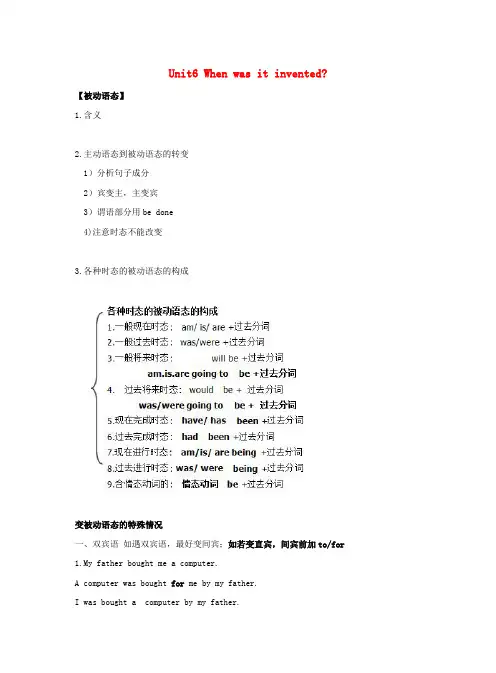
Unit6 When was it invented? 【被动语态】1.含义2.主动语态到被动语态的转变1)分析句子成分2)宾变主,主变宾3)谓语部分用be done4)注意时态不能改变3.各种时态的被动语态的构成变被动语态的特殊情况一、双宾语如遇双宾语,最好变间宾;如若变直宾,间宾前加to/for1.My father bought me a computer.A computer was bought for me by my father.I was bought a computer by my father.2.He gives me a book.A book is given to me by him.I am given a book by him二、无to不定式变为被动时加上to 感官动词真奇怪,被动语态to回来。
We often see him play basketball.He is often seen to play basketball by us.The boss made the children work for long.The children were made to work for long by the boss.三、注意动词短语的完整性take care of/look after/listen to/speak toThe old should be spoken to politely.The baby is taken good care of by the nurse四、不及物动词及系动词无被动语态happen /take place/ die/ rise /come true/ come out/run out被动语态练习一、将下列句子变为被动语态,每空一词。
1.We can finish the work in two days.The work _____ _____ _____ in two days.2.They produce silk in Suzhou.Silk ____ ______ in Suzhou.3.The children will sing an English song.An English song ____ ____ ___ by the children.4.I have given this book to the library.This book ___ ____ ____ to the library.5.Did they build a bridge here a year ago?____ a bridge ____ here by them a year ago?6.We'll put on an English play in our school.An English play ____ ____ _____ on in our school.7.More and more farmers buy color TV sets.Color TV sets ___ ___ ___ more and more farmers.8.We must water the flowers every day.The flowers must ___ ___ (by us) every day.9.They use knives for cutting things.Knives ___ ___ for cutting things.10.You can dig a hole in the earth.A Hole ____ ____ _____ in the earth.二、用动词的正确语态填空。
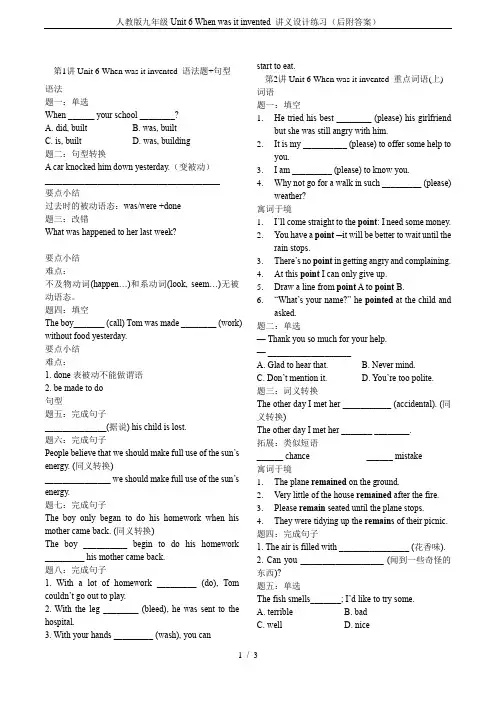
第1讲 Unit 6 When was it invented 语法题+句型语法题一:单选When ______ your school ________?A. did, builtB. was, builtC. is, builtD. was, building题二:句型转换A car knocked him down yesterday.(变被动)________________________________________要点小结过去时的被动语态:was/were +done题三:改错What was happened to her last week?要点小结难点:不及物动词(happen…)和系动词(look, seem…)无被动语态。
题四:填空The boy_______ (call) Tom was made ________ (work) without food yesterday.要点小结难点:1. done表被动不能做谓语2. be made to do句型题五:完成句子______________(据说) his child is lost.题六:完成句子People believe that we should make full use of the sun’s energy. (同义转换)_______________ we should make full use of the sun’s energy.题七:完成句子The boy only began to do his homework when his mother came back. (同义转换)The boy __________ begin to do his homework _________ his mother came back.题八:完成句子1. With a lot of homework _________ (do), Tom couldn’t go out to play.2. With the leg ________ (bleed), he was sent to the hospital.3. With your hands _________ (wash), you can start to eat.第2讲 Unit 6 When was it invented 重点词语(上) 词语题一:填空1.He tried his best ________ (please) his girlfriendbut she was still angry with him.2.It is my __________ (please) to offer some help toyou.3.I am _________ (please) to know you.4.Why not go for a walk in such _________ (please)weather?寓词于境1.I’ll come straight to the point: I need some money.2.You have a point ─it will be better to wait until therain stops.3.There’s no point in getting angry and complaining.4.At this point I can only give up.5.Draw a line from point A to point B.6.“What’s your name?” he pointed at the child andasked.题二:单选— Thank you so much for your help.— ___________________A. Glad to hear that.B. Never mind.C. Don’t mention it.D. You’re too polite.题三:词义转换The other day I met her ___________ (accidental). (同义转换)The other day I met her _______ ________.拓展:类似短语______ chance ______ mistake寓词于境1.The plane remained on the ground.2.Very little of the house remained after the fire.3.Please remain seated until the plane stops.4.They were tidying up the remains of their picnic.题四:完成句子1. The air is filled with ________________ (花香味).2. Can you ___________________ (闻到一些奇怪的东西)?题五:单选The fish smells_______; I’d like to try some.A. terribleB. badC. wellD. nice题六:take place happen1. Great changes have _______________ in our hometown during the past ten years.2. Maybe something unexpected ___________ last night.第3讲 Unit 6 When was it invented 重点词语(下) 词语题一:1. He is an honest boy. I have no doubt about what he said. (同义转换)He is an honest boy. I _______ ________ what he said.2. There is no doubt that this is the best result. (同义转换)_________ ________this is the best result.题二:填空1. All of a ______ (sudden), the windows opened.2. A few minutes later, it rained _______ (sudden).题三:完成句子1. 把蛋糕分成6块。
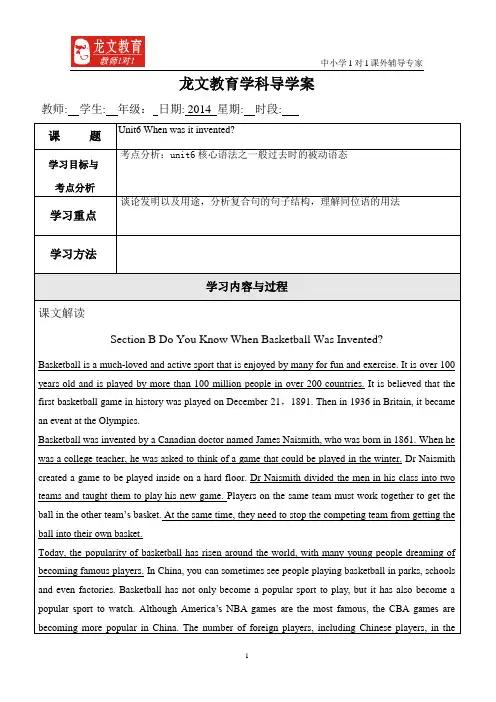
龙文教育学科导学案教师: 学生: 年级:日期: 2014 星期: 时段:课题第Unit6 When was it invented?考点分析:unit6核心语法之一般过去时的被动语态学习目标与考点分析谈论发明以及用途,分析复合句的句子结构,理解同位语的用法学习重点学习方法学习内容与过程课文解读Section B Do You Know When Basketball Was Invented?Basketball is a much-loved and active sport that is enjoyed by many for fun and exercise. It is over 100 years old and is played by more than 100 million people in over 200 countries. It is believed that the first basketball game in history was played on December 21,1891. Then in 1936 in Britain, it became an event at the Olympics.Basketball was invented by a Canadian doctor named James Naismith, who was born in 1861. When he was a college teacher, he was asked to think of a game that could be played in the winter. Dr Naismith created a game to be played inside on a hard floor. Dr Naismith divided the men in his class into two teams and taught them to play his new game. Players on the same team must work together to get the ball in the other team’s basket. At the same time, they need to stop the competing team from getting the ball into their own basket.Today, the popularity of basketball has risen around the world, with many young people dreaming of becoming famous players. In China, you can sometimes see people playing basketball in parks, schools and even factories. Basketball has not only become a popular sport to play, but it has also become a popular sport to watch. Although America’s NBA games are the most famous, the CBA games are becoming more popular in China. The number of foreign players, including Chinese players, in theNBA has increased. There are also more and more foreign players in the CBA. Many young people look up to these basketball heroes and want to become like them. These stars encourage young people to work hard to achieve their dreams.要点详解1.salty (tasting of salt)咸的eg: The soup is a little salty for me.注意:名词+后缀-y构成的形容词luck—lucky health—healthy wind—windy rain—rainy taste—tastyice—icy snow—snowy sun—sunny2.Potato chips were invented by mistake.by mistake 意为:错误地。
千里之行,始于足下。
Unit6 When was it invented学问点讲解及Unit 6: When was it invented? - Knowledge Points and ExplanationUnit 6 of the English course focuses on the topic of inventions and their respective timelines. In this unit, students learn about various inventions and their historical significance. They are also introduced to key vocabulary related to time expressions and basic grammar structures.1. Vocabulary:- Invention: Something new that has been created.- Patent: Legal ownership of an invention or idea.- Revolutionize: To completely change or transform something.- Prototype: The first model or design of an invention.- Innovation: A new idea, method, or device.- Breakthrough: A significant development or discovery.- Discover: To find something new or previously unknown.- Develop: To create or make progress in something.- Engineer: A person who designs and builds machines or structures.- Pioneering: Leading the way or being the first in something.- Groundbreaking: Innovative and influential.- Cutting-edge: The latest or most advanced.2. Important Inventions:第1页/共3页锲而不舍,金石可镂。
Unit6When was it invented?Words and Expressionsheel/hi:l/n.鞋跟;足跟scoop/sku:p/n.勺;铲子electricity/ɪˌlek'trɪsəti/n.电;电能style/staɪl/n.样式;款式project/'prɒdʒekt/,/'prɑ:dʒekt/n.项目;工程pleasure/'pleʒə(r)/n.高兴;愉快zipper/'zɪpə(r)/n.(=zip)拉链;拉锁daily/'deɪli/adj.每日的;日常的have a point有道理website/'websaɪt/n.网站pioneer/ˌpaɪə'nɪə(r)/,/ˌpaɪə'nɪr/n.先锋;先驱list/lɪst/v.列表;列清单n.名单;清单mention/'menʃn/v.提到;说到accidental/ˌæksɪ'dentl/adj.意外的;偶然的by accident偶然;意外地nearly/'nɪəli/,/'nɪrli/adv.几乎;差不多ruler/'ru:lə(r)/n.统治者;支配者boil/bɔɪl/v.煮沸;烧开remain/rɪ'meɪn/v.保持不变;剩余smell/smel/n.气味v.(smelt/smelt/,smelt;smelled;smelled)发出……气味;闻到saint/seɪnt/n.圣人;圣徒national/'næʃnəl/adj.国家的;民族的trade/treɪd/n.贸易;交易v.做买卖;从事贸易take place发生;出现doubt/daʊt/n.疑惑;疑问v.怀疑without doubt毫无疑问;的确fridge/frɪdʒ/n.冰箱low/ləʊ/adj.低的;矮的somebody/'sʌmbədi/pron.某人n.重要人物translate/træns'leɪt/v.翻译lock/lɒk/,/lɑ:k/v.锁上;锁住n.锁earthquake/'ɜ:(r)θkweɪk/n.地震sudden/'sʌdn]/adj.突然(的)all of a sudden突然;猛地bell/bel/n.钟(声);铃(声)biscuit/'bɪskɪt/n.饼干cookie/'kʊki/n.曲奇饼musical/'mju:zɪkl/adj.音乐的;有音乐天赋的instrument/'ɪnstrəmənt/n.器械;仪器;工具crispy/'krɪspi/adj.脆的;酥脆的salty/'sɔ:lti/adj.咸的sour/'saʊə(r)/adj.酸的;有酸味的by mistake错误地;无意中customer/'kʌstəmə(r)/n.顾客;客户the Olympics/ə'lɪmpɪks/奥林匹克运动会Canadian/kə'neɪdiən/adj.加拿大的;加拿大人的n.加拿大人divide/dɪ'vaɪd/v.分开;分散divide…into把……分开basket/'bɑ:skɪt/,/'bæskɪt/n.篮;筐popularity/ˌpɒpju'lærəti/,/ˌpɑ:pju'lærəti/n.受欢迎;普及not only…but also…不但……而且……look up to钦佩;仰慕hero/'hɪərəʊ/,/'hɪroʊ/n.英雄;男主角professional/prə'feʃənl/adj.职业的;专业的Berlin/bɜ(r):'lɪn/柏林(德国城市)NBA(National Basketball Association)国家篮球协会(美国职业篮球联赛) CBA(China basketball association)中国篮球协会(中国职业篮球联赛) Roy/bɔɪ/罗伊(男名)Whitcomb/wɪtkəm/Judson/dʒʌdsən/惠特科姆·贾德森Ruby/'rubi/鲁比(女名)Thomas/'tɒməs/Watson/'wɒtsən/托马斯·沃森George/dʒɔ:(r)dʒ/Crum/krʌm/乔治·克拉姆James/dʒeɪmz/Naismith/'neɪsmɪθ/詹姆斯·奈史密斯Role-play the conversation.Paul:Hey Roy,the subject for my school project is“Smallinventions that changed the world.”Can you help methink of an invention?Roy:My pleasure!Let me think...hmm...I know!Thezipper!Paul:The zipper?Is it really such a great invention?Roy:Think about how often it’s used in our daily lives.You can see zippers on dresses, trousers,shoes,bags...almost everywhere!Paul:Well,you do seem to have a point...Roy:Of course!I thought about it because I saw a website last week.The pioneers of different inventions were listed there.For example,it mentioned that the zipper was invented by Whitcomb Judson in1893.But at that time,it wasn’t used widely. Paul:Really?So when did it become popular?Roy:Around1917.Reading1Read the passage quickly and match each paragraph with its main idea.Paragraph1Lu Yu and his book Cha JingParagraph2How tea spread to other countriesParagraph3How tea was invented by accidentAn Accidental InventionDid you know that tea,the most popular drink in the world(after water),was invented by accident?Many people believe that tea was first drunk about5,000years ago.It is said that a Chinese ruler called Shen Nong was the first to discover tea as a drink.One day Shen Nong was boiling drinking water over an open fire.Some leaves from a tea plant fell into the water and remained there for some time.It produced a nice smell so he tasted the brown water.It was quite delicious,and so,one of the world’s favorite drinks was invented.A few thousand years later,Lu Yu,“the saint of tea”,mentioned ShenNong in his book Cha Jing.The book describes how tea plants weregrown and used to make tea.It also discusses where the finest tealeaves were produced and what kinds of water were used.It is believed that tea was brought to Korea and Japan during the6thand7th centuries.In England,tea didn’t appear until around1660,but in less than100years,it had become the national drink.The tea trade from China to Western countries took place in the 19th century.This helped to spread the popularity of tea and the tea plant to more places around the world.Even though many people now know about tea culture,the Chinese are without doubt the ones who best understand the nature of tea.3c Complete the sentences with the correct forms of the verbs in the box.invent drink bring produce trade1.One of the world’s favorite drinks was_______by accident.2.Tea was first______by Shen Nong about5,000years ago.3.A nice smell was______when the tea leaves dropped into the hot water.4.Tea was______to Korea and Japan during the6th and7th centuries.5.Tea is now______between many different countries.Grammar FocusWhen was the zipper invented?It was invented in1893.Who was it invented by?It was invented by Whitcomb Judson.When was tea brought to Korea?It was brought to Korea during the6th and7thcenturies.What is the hot ice-cream scoop used for?It’s used for serving really cold ice-cream. Active Voice:Alexander Graham Bell invented the telephone in1876.Passive Voice:The telephone was invented(by Alexander Graham Bell)in1876.语法小结:一般过去时的被动语态was/were+done一、一般过去时的被动语态1.构成:主语+was/were+及物动词的过去分词。
Unit 6 When was it invented?第一课时Section A(1a~2d)01 基础过关Ⅰ.根据句意及汉语提示填写单词。
1.The Russians were the pioneers(先驱) of space travel.2.Do you like the style(款式) of the T-shirt?3.Our new project(项目) is to build a new hospital in the city center.4.Some important things were mentioned(提到) in his report.5.She listed(列举) all the good restaurants in this city yesterday morning.Ⅱ.用括号内所给单词的适当形式填空。
6.Mrs.Green bought a pair of shoes with special heels(heel) yesterday.7.In our daily(day) lives,we should pay attention to our actions.8.Music can offer pleasure(please) to us,so many people like listening to it.9.I think the light bulb is one of the most important inventions(invent).10.Please write down two useful websites(website).Ⅲ.根据汉语意思完成句子,每空一词。
11.这个锅是用来做汤的。
This pot is used for making soup.12.他们说的似乎有道理。
What they said seemed to have a point.13.你能在黑暗中看见我们吗?Can you see us in the dark?14.那个机器人是她叔叔两年前发明的。
Unit 6 When was it invented 第四课时Section B(1a~1e)01 基础过关Ⅰ.根据句意及首字母或汉语提示填写单词。
1.Because of the wet weather,these biscuits are not crispy(脆的).They have become a little soft.2.Tom played computer games until 12:00 last night.3.The apple looks green,but it doesn't taste sour(酸的).4.Mrs.Smith put some salt into her tea by mistake.5.For a restaurant,customers are the most important.Ⅱ.用括号内所给单词的适当形式填空。
6.I have a good friend called(call) Mike.7.The soup is too salty(salt) to drink.8.My mother bought ten eggs and three potatoes(potato) just now.9.He worked out the math problem by joining(join) “A” and “B” together.10.Tony is quieter(quiet) than his brother Jim.02 能力提升Ⅲ.完形填空。
Coffee has been a part of people's lives for thousands of years,and today it is still a favorite __11__ of millions of people in the world.Coffeeis so popular,but do you know the story of coffee and __12__ it was discovered?There is an old story that __13__ coffee was discovered in Africa a long,long time ago.One day,a farmer was __14__ his goats,and he saw them eat some small berries(干种子) __15__ a plant.After they ate the berries,the goats became very __16__.The man often felt __17__,so he decided to try the berries too.Surprisingly,he didn't feel tired __18__.Coffee plants were __19__ in this way.Then coffee was taken from Africa to Arabia(阿拉伯半岛),and there it was first used as medicine.The Arabs kept coffee a(n) __20__ for many ter,coffee came to Turkey,then Italy,then France.From Europe,the coffee plant was taken to America. People found that coffee plants __21__ well in many parts of South America, __22__ large coffee farms were started,and many coffee plants were grown.On these farms,coffee beans were picked from the plants by __23__.Then the beans were dried and prepared for __24__ to sell.Different coffee beans were mixed together to __25__ different kinds of coffee.Coffee was sent to all over the world,and soon became very popular.(A)11.A.drink B.fruitC.food D.vegetables(C)12.A.what B.whereC.how D.why(B)13.A.speaks B.saysC.tells D.talks(A)14.A.watching B.mentioningC.avoiding D.trading(D)15.A.with B.forC.by D.from(C)16.A.sleepy B.sickC.active D.nervous(B)17.A.excited B.tiredC.comfortable D.happy(A)18.A.anymore B.eitherC.yet D.already(B)19.A.protected B.discoveredC.listed D.processed(D)20.A.pleasure B.ideaC.style D.secret(A)21.A.grew B.plantedC.bought D.sold(D)22.A.but B.becauseC.though D.so(B)23.A.arm B.handC.foot D.leg(A)24.A.markets B.farmsC.museums D.bathrooms(C)25.A.build B.drinkC.produce D.enjoy1。
Unit 6 When was it invented?Words and Expressionsheel /hi:l/ n.鞋跟;足跟scoop /sku:p/ n.勺;铲子electricity /ɪˌlek'trɪsəti/ n. 电;电能style /staɪl/ n.样式;款式project /'prɒdʒekt/, /'prɑ:dʒekt/ n. 项目;工程pleasure /'pleʒə(r)/ n. 高兴;愉快zipper /'zɪpə(r)/ n. (=zip)拉链;拉锁daily /'deɪli/ adj.每日的;日常的have a point 有道理website /'websaɪt/ n.网站p ioneer /ˌpaɪə'nɪə(r)/, /ˌpaɪə'nɪr/ n. 先锋;先驱list /lɪst/ v. 列表;列清单n. 名单;清单mention /'menʃn/ v. 提到;说到accidental /ˌæksɪ'dentl/ adj. 意外的;偶然的by accident 偶然;意外地nearly /'nɪəli/, /'nɪrli/ adv. 几乎;差不多ruler /'ru:lə(r)/ n. 统治者;支配者boil /bɔɪl/ v. 煮沸;烧开remain /rɪ'meɪn/ v. 保持不变;剩余smell /smel/ n. 气味v. (smelt /smelt/,smelt; smelled; smelled)发出……气味;闻到saint /seɪnt/ n. 圣人;圣徒national /'næʃnəl/ adj. 国家的;民族的trade /treɪd/ n. 贸易;交易v. 做买卖;从事贸易take place 发生;出现doubt /daʊt/ n. 疑惑;疑问v.怀疑without doubt 毫无疑问;的确fridge /frɪdʒ/ n. 冰箱low /ləʊ/ adj.低的;矮的somebody /'sʌmbədi/ pron.某人n. 重要人物translate /træns'leɪt/ v.翻译lock /lɒk/, /lɑ:k/ v. 锁上;锁住n. 锁earthquake /'ɜ:(r)θkweɪk/ n. 地震sudden /'sʌdn]/ adj. 突然(的)all of a sudden 突然;猛地bell /bel/ n. 钟(声);铃(声) biscuit /'bɪskɪt/ n. 饼干cookie /'kʊki/ n. 曲奇饼musical /'mju:zɪkl/ adj.音乐的;有音乐天赋的instrument /'ɪnstrəmənt/ n. 器械;仪器;工具crispy /'krɪspi/ adj. 脆的;酥脆的salty /'sɔ:lti/ adj. 咸的sour /'saʊə(r)/ adj.酸的;有酸味的by mistake 错误地;无意中customer /'kʌstəmə(r)/ n.顾客;客户the Olympics /ə'lɪmpɪks/ 奥林匹克运动会Canadian /kə'neɪdiən/ adj. 加拿大的;加拿大人的n. 加拿大人divide /dɪ'vaɪd/ v. 分开;分散divide…into 把……分开basket /'bɑ:skɪt/, /'bæskɪt/ n. 篮;筐popularity /ˌpɒpju'lærəti/, /ˌpɑ:pju'lærəti/ n.受欢迎;普及not only…but also… 不但……而且…… look up to 钦佩;仰慕hero /'hɪərəʊ/, /'hɪroʊ/ n. 英雄;男主角professional /prə'feʃənl/ adj. 职业的;专业的Berlin /bɜ(r):'lɪn/ 柏林(德国城市)NBA (National Basketball Association) 国家篮球协会(美国职业篮球联赛)CBA (China basketball association) 中国篮球协会(中国职业篮球联赛)Roy /bɔɪ/ 罗伊(男名)Whitcomb /wɪtkəm/ Judson /dʒʌdsən/ 惠特科姆·贾德森Ruby /'rubi/ 鲁比(女名)Thomas /'tɒməs/ Watson /'wɒtsən/ 托马斯·沃森George /dʒɔ:(r)dʒ / Crum /krʌm/ 乔治·克拉姆James /dʒeɪmz/ Naismith /'neɪsmɪθ/ 詹姆斯·奈史密斯Role-play the conversation.Paul: Hey Roy, the subject for my school project is “Smallinventions that changed the world.” Can you help methink of an invention?Roy: My pleasure! Let me think ... hmm ... I know! The zipper!Paul: The zipper? Is it really such a great invention?Roy: Think about how often it’s used in our daily lives. You can see zippers on dresses, trousers, shoes, bags ... almosteverywhere!Paul: Well, you do seem to have a point ...Roy: Of course! I thought about it because I saw a website last week. The pioneers of different inventions were listed there.For example, it mentioned that the zipper was invented byWhitcomb Judson in 1893. But at that time, it wasn’t usedwidely.Paul: Really? So when did it become popular?Roy: Around 1917.Reading 1Read the passage quickly and match each paragraph with its main idea.Paragraph 1 Lu Yu and his book Cha JingParagraph 2 How tea spread to other countriesParagraph 3 How tea was invented by accidentAn Accidental InventionDid you know that tea, the most popular drink in the world (after water), was invented by accident? Many people believe that tea was first drunk about 5,000 years ago. It is said that a Chinese ruler called Shen Nong was the first to discover tea as a drink. One day Shen Nong was boiling drinking water over an open fire. Some leaves from a tea plant fell into the water and remained there for some time. It produced a nice smell so he tasted the brown water. It was quite delicious, and so, one of the world’s favorite drinks was invented.A few thousand years later, Lu Yu, “thesaint of tea”, mentioned Shen Nong in hisbook Cha Jing. The book describes howtea plants were grown and used to maketea. It also discusses where the finest tealeaves were produced and what kinds ofwater were used.It is believed that tea was brought to Korea and Japan during the 6th and 7th centuries. In England, tea didn’t appear unt il around 1660, but in less than 100 years, it had become the national drink. The tea trade from China to Western countries took place in the 19th century. This helped to spread the popularity of tea and the tea plant to more places around the world. Even though many people now know about tea culture, the Chinese are without doubt the ones who best understand the nature of tea.3c Complete the sentences with the correct forms of the verbs ininvent drink bring produce trade1.One of the world’s favorite drinks was _______ byaccident.2.Tea was first ______ by Shen Nong about 5,000 yearsago.3. A nice smell was ______ when the tea leaves droppedinto the hot water.4.Tea was ______ to Korea and Japan during the 6th and7th centuries.5.Tea is now ______ between many different countries. Grammar Focus语法小结:一般过去时的被动语态was/were +done一、一般过去时的被动语态1. 构成: 主语+ was/were +及物动词的过去分词。
Unit6 When was it invented? 教师: 学生: 年级:日期: 2014 星期: 时段:
辨析pleasure / pleased / pleasant
pleasure n. 高兴,愉悦My pleasure. /With pleasure / It’s a pleasure. --Thanks for helping me. –My pleasure. pleased adj 高兴的be pleased to do sth 乐于做某事be pleased with 对。
满意
Do not mention it. I am very pleased to help you.
The teacher was pleased with the students' performance.
pleasant adj 令人愉悦的Wish you a pleasant journey.
3.Think about how often it’s used in our daily lives.
Don’t you read the daily news in today’s newspaper?
daily作副词时,每日,每天The milkman comes daily to our house.
4.Well, you do seem to have a point…看来你说的确实有道理
have a point意为:有道理You have a point—It would be better to wait till tomorrow.
5.The pioneer of different inventions were listed there.
list 列表,列清单List them and you will never forget them.
list还可作名词意为:名单,清单I didn’t see his name on the list.
6.For example, it mentioned that the zipper was invented by Whitcomb Judson in 1893.
mention意为;提到,说到,其后可接that引导的宾语从句。
eg:He mentioned that the food was invented by a Chinese.
扩展:mention sth( to sb )
Nobody mentioned anything to me about it.
mention doing sth===== Whenever I mention havin dinner together, he says he’s too busy.
注意:Don’t mention it. Z主要来回答感谢,有时也用来回答道歉。
---Thank you very much. ----Don’t mention it
参考答案
单选1—5 CBCCC 6---10 BACCC 11—15 CABCA 16—20 CABBC 完型1—5 BCAAC 6—10 BCCBA
②over用作副词,意为结束Class is over.
③与over 相关的短语:
over there 在那边get over 客服go over 检查
all over the world 全世界over and over again 多次;反复地
5. Basketball was invented by a Canadian doctor named James Naismith, who was born in 1861.
Canadian adj---加拿大的;加拿大人的n---加拿大人
eg; Canadian culture is different from Chinese culture. Many of my friends are Canadians.
6. When he was a college teacher, he was asked to think of a game that could be played in the winter.
could be played 为情态动词的被动语态,结构为:情态动词+be+ done , 否定形式为: 情态动词+not+be+done All these must be finished in three years.
Kids should not be allowed to drink.
7. Dr Naismith divided the men in his class into two teams and taught them to play his new game.
divide…into 把…..分开;把…..划分为
The teacher divided our class into four groups.
divide up 分享The children divided up the candy among themselves.
8. At the same time, they need to stop the competing team from getting the ball into their own basket.
stop sb from doing sth 阻止某人做某事,相当于prevent sb from doing sth.
注意:在主动语态中两者中的from 可以省略,被动语态中不可省略
No one can stop us (from) carrying out the plan. The water must be prevented from being polluted by us.
9. Today, the popularity of basketball has risen around the world, with many young people dreaming of becoming famous players.
popularity n. 受欢迎,普及His books have grown in popularity recently.
rise vi 意为:增加,提高,上升,站起来The sun rises in the east and sets in the west.
辨析rise , raise
rise vi增加,上升,站起来,不能用于被动语态Meat prices are still rising.
raise vt 提高,增加,举起The man raised his voice and I heard what he said.
with+宾语+现在分词构成的复合结构在句中作伴随状语
With winter coming on, it’s time to buy warm clothes.
with+宾语+宾补构成with的复合结构,宾补除了可以是现在分词,还可以是介词短语、形容词、副词等。
He came in with a smile on his face.
dream of 意为:梦想,想象They dream of going to college.
扩展:dream作及物动词,后可接名词、代词或that从句作宾语
He dreamed a sweet dream.
10. Many young people look up to these basketball heroes and want to become like them.
look up to 钦佩,仰慕We all look up to the learned and modest professor.
He is a movie star whom I look up to.
look up to还意为:抬头看,仰望He looked up to the sky…….
11. These stars encourage young people to work hard to achieve their dreams.
encourage: 鼓励,激励常用结构:encourage sb to do sth
Parents should encourage children to do things by themselves.
achieve 实现,完成He could not achieve his goal.
辨析:achieve与come true
achieve 完成,实现主语通常是人
come true 实现,主语通常是梦想等
Unit6 SectionB答案
1. invented
2. adjustable
3. microwave
4. salty
5. mistake
6. accident
7. produced
8. pleasant
9. camera
单选
1-5 BDCCB 6-10 AADDD 11-15 DADAC 16-20 CABDC
完型
1-5 BCAAB 6-10 DCDCD
Unit6 课后作业
单选1-5 ACCAB 6-10 BBCAD
完型11-15 BADDB 16-20 CDCBC
21-25 daily hearing salty;salt popularity nearly。